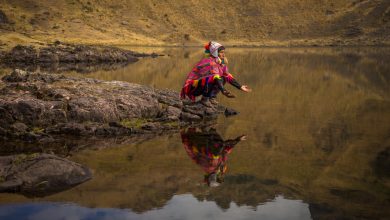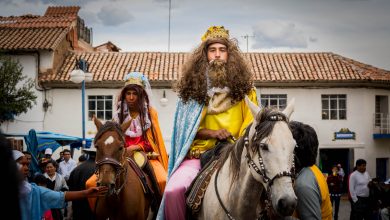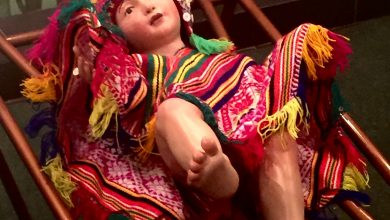A Popular Tale on the Origin of Cocaine

One custom that is much honoured down to our days in the popular neighbourhoods of Cusco is drinking Chicha. The chicherías, places where it is served, are still welcoming and magical places where one can rest from the pressures of daily life. There, you can feel comfortable and calm, whether you are alone or with someone else. The chicherías are, of course, places to be social and points in which old friends encounter one another.
One afternoon when I was coming home in the infernal heat of an afternoon I decided to drink a glass of chicha as a balm to calm my thirst. The chicha was not just a relief it was also a joy. My intention, at that moment, was to seek refuge for just a moment from the intense heat in the shade inside a chichería at the same time I slaked my thirst. Satisfied, I was getting ready to leave, when a man in traditional dress of a worker of the land offered me some coca leaves.
Out of courtesy I accepted. I just thought it was a custom that had survived and resisted modernization. The very attentive man noticed my lack of enthusiasm and so spoke to me about the perception he has of young people and the consumption of coca leaves. He subtly told me that many youths in his community are now ashamed of certain customs and that they tend to like customs that are more alienated, more urban.
I saw something logical in his discourse. Sometimes he relied on Quechua words and laughed loudly at the attitude of modern man. He even spoke about how people make vilify coca leaves when they make it into cocaine. 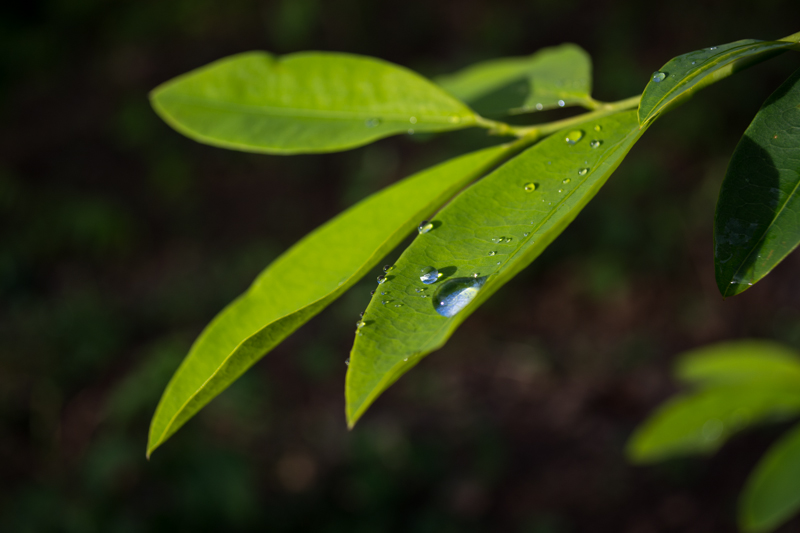
His point of view surprised me. I started chewing the coca leaves and asked for another glass of chicha to listen to him a bit more. He told me that he had once heard about the origin of cocaine. Another wayqe, brother, had told it to him. I was curious to know the story more than the source.

It says that a man escaped the bad treatment to which he was exposed on an old hacienda found in a community hidden in the mountains of Peru`s central jungle. He fled so he could not be caught and sought refuge in a river gold mining camp. His luck there was even worse. He had to submit himself to the harsh work conditions and to the mistreatment dished out by the work foreman, the capataz. He was constantly harder on the workers when they suffered bad luck in the search for nuggets of gold.
The man worked to survive and pay off his debts to the owner of the gold camp for taking him in. With every passing day, he felt more and more unfortunate. His fate did not change. He had not even known love and felt very alone. He learned the custom of drinking burning hot water to calm his sorrows and to chacchar, chew, coca leaves to keep himself strong at work. Sometimes he fell into melancholy and got drunk to forget his solitude.
On one of those occasions he cursed his fate and even blasphemed against God. He thought he could handle it no more and that it was best if he just threw himself into the river.
At that precise moment, a man dressed in an elegant suit appeared to him. The worker could not believe it. Out of fright he regained his consciousness, though he was stiff with fear. He did not know what to do. The subject with the suit told him he had come to resolve his problems and to change his luck.

In the face of that proposal the man regained his full senses. He stood up incredulous at what the man in the suit said to him. He looked at him carefully and asked: “How do you think you can change my fate? The man in the suit answered: “ask me what you will and I will give it to you.”
The man thought for a while about what he could request to change his luck. Almost immediately, he got his answer. The key was money. If he were a rich man he would not have to work. Even more, he would be important and would have blessings. He could leave the mining camp and enjoy life and maybe even know love. He could even lose his solitude. He decided that what he needed was a lot of gold in order to have money and immediately asked the man in the suit for that.
In response, the suited man told him to be patient but not to doubt that the promise would be kept and soon would find a great fortune.
Having said this, the man in the suit disappeared suddenly. The poor man was shocked and fainted. The only thing he could sense in the air before fainting was a strong sulfurous smell.
When he woke up he was stretched out by the river. Nothing had changed, though he clearly remembered the conversation he had with the suited man. Without much enthusiasm, he decided to continue living, not so much because of the apparition he had seen but because he decided he wanted to live.
When he went back to work, he could remember the words told him by the man in the suit. He thought that may his luck would change. He believed the man’s words and thought that, in the end, he lost nothing by continuing to seek the treasure the man had promised him.

He continued forward and, to his surprise, his luck began to change. That same day he found sufficient gold to pay his debt to the owner of the mining camp. The next day he found more and with every passing day, more. His work mates realized he had luck on his side and suggested before long that he become the boss of a mining camp. He abandoned the one where he was and bought his own camp. He was no longer just the owner of one camp but constantly more. His luck had changed in an instant, from night to morning as we say.
He could now return to that hidden community in the central jungle. He now had more money than the hacienda owners. He bought up all the land he could since that was his birth place.
He now stood out as an important personage and, as had been foreseen, other important people in the area offered their daughter’s hands in marriage. Who would not want to create kinship with such a prominent man. He fell in love with a young woman, something he had never been able to do before, got married and had children. His life was prosperous and calm. He even had quit drinking thanks to his wife.
Some years later in one of his daughters’ weddings, nevertheless, he drank too much. Drunk on whiskey, something new for him, he left the party to not draw much attention to him. He sat down at the side of a tree to chacchar, chew, come coca leaves in order to recover from being drunk.

The same suited man who had promised him the fortune appeared to him again. He now realized this man was the Macho Saqra, (the Devil). “Well”, the suited man said, “I have come for your soul. I fulfilled my part of the bargain and now I come for that which belongs to me.” At that moment, he realized that everything comes with a price and that the Machu Saqra had given him the gold in exchange for his soul.
Confused by the apparition, he put a few leaves of coca in his mouth in order to be less drunk and react better and more consciously. He chewed quickly and decided to lay a trap for the devil through a kind of riddle. “It is ok, Machu Saqra. If you have come to take my soul I will not fight you, but only if you can answer me correctly. Why is my mouth so swollen? The devil looked at his fixedly and noted that his cheeks were indeed swollen and round. He gave a laugh and responded to the man: “You have a tooth ache, that is why your cheeks are swollen.”
Almost immediately the man pulled from his mouth green balls of masticated coca mixed with saliva. On seeing them, the devil was furious and said: “You have tricked me. I will go without your soul, but I will work to keep men from chewing coca.”
The man fainted from the sulfurous odor and the disappearance of the demon. When he awoke the next day, he found a white powder staining his clothes, the devil’s dandruff.
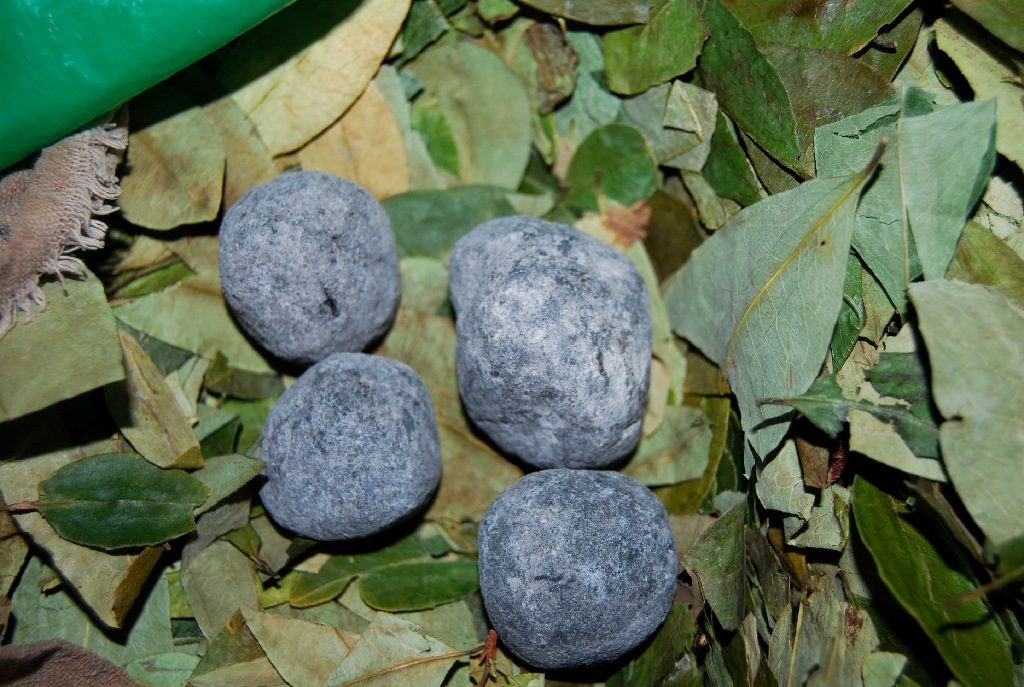
I found the tale fun and similar to many other popular tales that I had heard about the devil. It was singular because it spoke about cocaine. This man made me reflect on the great quantity of tale that have been written about gold, the demon, and coca leaves. One of my favorites was “How Coca Talks” by Enrique López Albujar. I also thought about other people who had written treatises about cocaine. I remembered Sigmund Freud who had problems with it. Now, in our days, its use is growing, in spite of its prohibition. And, what has even more impact, the production of coca leaves is now being banned.

